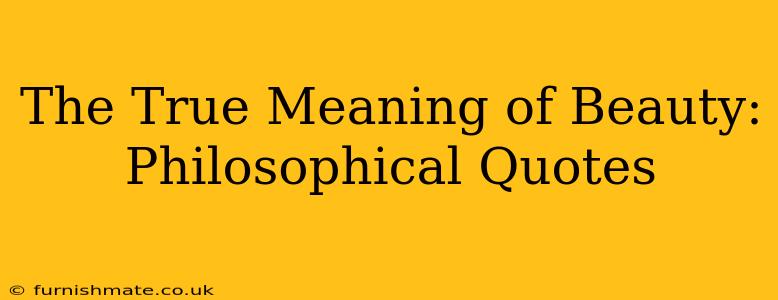Beauty. The word itself evokes a myriad of images, feelings, and interpretations. Is it skin deep, a fleeting moment captured in a photograph, or something far more profound and enduring? Philosophers throughout history have grappled with this question, offering diverse perspectives on the true meaning of beauty. This exploration delves into the philosophical understanding of beauty, utilizing insightful quotes to illuminate its multifaceted nature. We'll unravel the complexities, exploring both the objective and subjective aspects of beauty, and delve into its impact on our lives.
What is Beauty, Objectively?
The search for an objective definition of beauty has plagued thinkers for centuries. Is there a universal standard, a set of criteria that dictates what is beautiful and what is not? Plato, in his theory of Forms, posited the existence of an ideal form of beauty, a perfect archetype that all earthly manifestations imperfectly reflect. This suggests an objective standard, though one inaccessible to our senses.
"Beauty is truth, truth beauty,—that is all ye know on earth, and all ye need to know." - John Keats
Keats' famous line, while poetic, highlights the potential interconnectedness of beauty and truth. If beauty is rooted in a fundamental truth, then it could be argued that an objective standard exists, though its discovery remains a challenge. This inherent truth might be found in harmonious proportions, balanced compositions, or a sense of order and completeness. However, the subjective interpretation of these elements remains a crucial factor.
Is Beauty Subjective?
The opposing viewpoint emphasizes the subjective nature of beauty. What one person finds beautiful, another might find indifferent or even repulsive. This subjective experience is shaped by personal preferences, cultural background, and individual experiences.
"We don't see things as they are, we see them as we are." - Anaïs Nin
Nin's observation elegantly captures the subjective lens through which we perceive beauty. Our individual experiences, beliefs, and emotions profoundly color our aesthetic judgments. The beauty of a sunset, a piece of music, or a work of art depends largely on the beholder's unique perspective.
What Makes Something Beautiful?
This question delves into the essence of beauty's constituents. Is it solely a matter of visual appeal, or do other factors play a significant role?
"Beauty in things exists in the mind which contemplates them." - David Hume
Hume's assertion emphasizes the active role of the observer in constructing the experience of beauty. Beauty isn't an inherent property of an object but rather a product of the interaction between the observer and the object. This underscores the subjective element, highlighting how individual perception shapes the experience.
What are the different types of beauty?
Beauty isn't limited to the visual realm. Philosophers have explored various forms of beauty, encompassing intellectual, moral, and spiritual dimensions. The beauty of a mathematical equation, the elegance of a moral argument, or the sublime power of nature all demonstrate the breadth and depth of this concept. This interconnectedness highlights how the perception of beauty is not confined to a single sensory input.
How does beauty affect our emotions?
The experience of beauty often elicits strong emotions: awe, joy, wonder, even a sense of transcendence. The profound emotional impact of beauty further emphasizes its subjective nature, as each individual responds uniquely to the stimulating object.
Can beauty be defined?
The very attempt to define beauty reveals its elusive nature. A precise definition remains a challenge due to its subjective and multifaceted characteristics. Any definition would inevitably fall short, failing to capture the full spectrum of human experience and interpretation.
The Enduring Power of Beauty
Despite its elusive nature, the search for and appreciation of beauty remain integral aspects of the human experience. Its power to inspire, uplift, and connect us transcends cultural boundaries and personal differences. Whether viewed objectively or subjectively, beauty serves as a powerful reminder of the inherent wonder and mystery of the world around us. The exploration of beauty, therefore, is an ongoing journey of self-discovery and philosophical contemplation.

